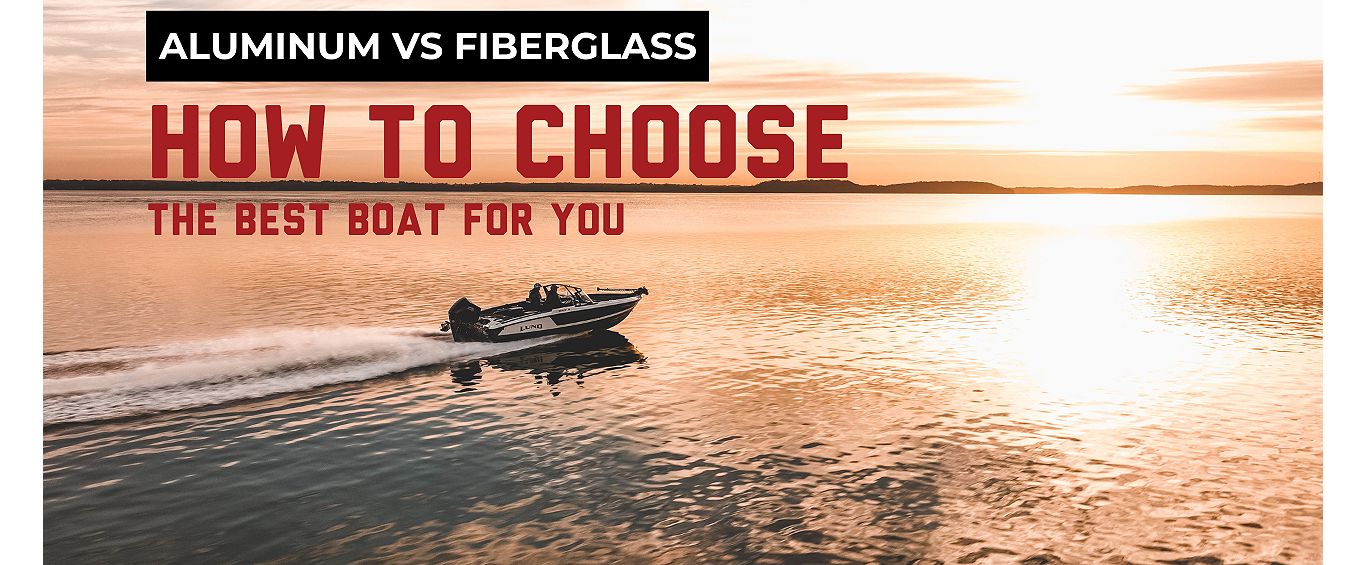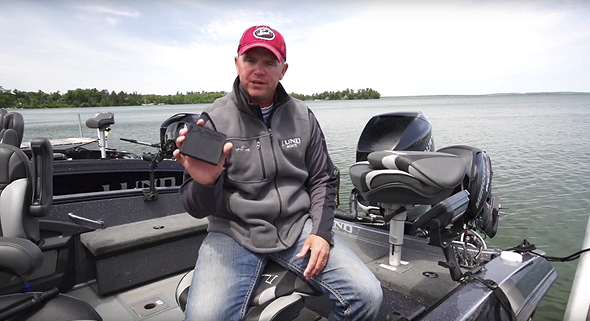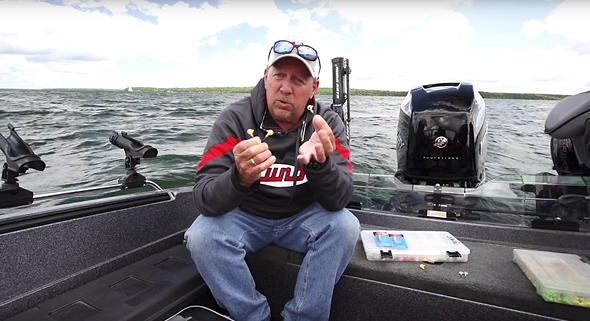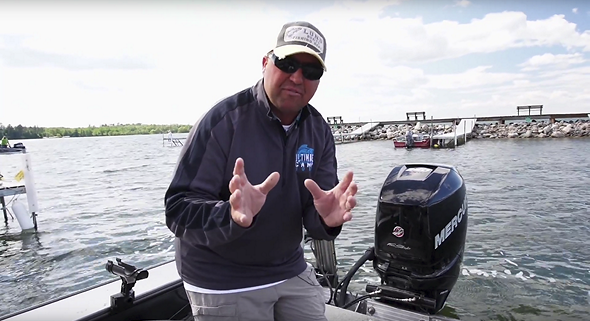Aluminum vs. Fiberglass Boats: How To Choose The Best Boat
Whether you're a seasoned angler or a first-timer planning new adventures, the experts at Lund will help you discover if an aluminum or fiberglass boat is right for your needs.

When buying a hunting or fishing boat, choosing between aluminum and fiberglass is an important first-step. Understanding the unique qualities of each material will aid in helping you choose the right boat. Lund offers aluminum and fiberglass boats; each material possesses unique characteristics and qualities that will impact your time on the water.
Our aluminum boats are celebrated for their durability and lightweight nature, ideal for rugged environments and rough waters. On the other hand, our fiberglass boats are renowned for their sleek designs and superior performance on big bodies of water. We will explore important aspects such as durability, performance, maintenance requirements, and cost considerations to help you choose the best material that aligns with your fishing and boating goals.
Whether you're a seasoned angler or a first timer planning new adventures, we'll help you discover whether an aluminum or fiberglass boat is the right model for your specific needs.
Characteristics and Benefits of Aluminum as a Boat Material
Lund's Aluminum boats have been trusted for generations and have unique characteristics that make them popular for anglers. First and foremost, aluminum is incredibly durable, with high resistance to impact and corrosion. This durability ensures that aluminum boats can withstand rough waters and challenging conditions, offering peace of mind to owners. You can still find many Lund fishing and hunting boats on the water that are 40+ years old.
Furthermore, aluminum's lightweight nature provides several advantages. It contributes to better fuel efficiency, allowing anglers to go farther and longer. The lightweight construction also enhances the boat's maneuverability and handling, making it easier to navigate and control on the water, especially for new boaters.
In addition to durability and lightweight properties, aluminum boats are relatively low maintenance. They require less upkeep than other materials, reducing the time and effort spent on care.
Overall, the durability, lightweight nature, combined with Lund’s innovation and quality make our aluminum boat an excellent choice for boaters seeking a reliable and efficient vessel for their on- water adventures
Maintenance Requirements of Aluminum Boats
One of the advantages of aluminum boats is their relatively low maintenance requirements, making them an appealing option for boaters seeking convenience and ease of ownership. Aluminum's natural resistance to corrosion eliminates the need for regular painting or coating to protect the hull. Unlike other materials, aluminum does not rust, saving boaters time and effort.
Maintenance tasks for aluminum boats primarily involve routine cleaning and inspection, including regular washing with mild soap and water to remove surface dirt and other contaminants, plus inspecting for any signs of damage or loose fittings. Keeping up with routine maintenance could help to avoid costly repairs.
Overall, aluminum boats offer the advantage of reduced maintenance obligations, however, it's still essential to follow manufacturer guidelines and consult your local Lund dealer for specific maintenance requirements.
Exploring the Features and Advantages of Fiberglass Boats
Fiberglass boats are known for their versatility in design and construction. Fiberglass allows for precise molding, resulting in sleek and aerodynamic hull shapes that enhance the boat's performance and speed.
In addition to its aesthetic appeal, Lund’s fiberglass boats offer excellent durability and resistance to impacts. Their robust construction ensures longevity, making them reliable and long-lasting. Fiberglass boats also provide a smooth and comfortable ride thanks to their ability to dampen vibrations and reduce noise.
Another advantage of fiberglass is the relatively low maintenance requirements. It doesn't require regular painting or varnishing like wooden boats and is resistant to rot and corrosion.
Overall, the features and advantages of fiberglass, including its versatility, durability, smooth ride, and low maintenance, make it a great material for those seeking a high-performance and reliable boat.
Drawbacks and Maintenance Considerations of Fiberglass Boats
While fiberglass boats offer numerous advantages, one of the primary concerns with fiberglass is its vulnerability to impact damage. Although Lund boats come with an industry-leading warranty program that helps ensure your investment is protected, it’s important to know that fiberglass can crack or develop stress fractures, unlike aluminum, when subjected to significant impacts or collisions.
Fiberglass is generally low maintenance compared to other materials, but will require periodic waxing or polishing to maintain its glossy appearance. Over time, the gel coat on the surface of fiberglass boats may fade or develop small cracks, requiring repairs or refinishing.
Furthermore, repairing fiberglass can be more involved than fixing other boat materials. Structural damage or deep scratches may require professional fiberglass repair expertise to ensure proper restoration.
Despite these considerations, with proper care and maintenance, fiberglass boats can provide many years of enjoyable boating. Regular inspections, prompt repairs, and adherence to manufacturer guidelines can help mitigate potential issues and prolong the lifespan of fiberglass boats.
Comparing Aluminum and Fiberglass
Comparing the Durability and Longevity of Aluminum and Fiberglass Boats
When considering boats' durability and longevity, aluminum and fiberglass materials have their own advantages. Lund's aluminum boats are renowned for their exceptional strength and durability. They can withstand rough waters and rock environments, making them a reliable choice for anglers fishing in rocky northern shield lakes. Aluminum's corrosion resistance ensures a longer lifespan, even in saltwater conditions.
Fiberglass boats are also highly durable. They are less prone to dents and scratches compared to aluminum, and can offer excellent longevity if properly maintained, with their gel coat protecting the underlying fiberglass structure.
Ultimately, the durability and longevity of both aluminum and fiberglass boats depend on factors such as usage, maintenance, and care. Proper upkeep, regular inspections, and adherence to manufacturer guidelines will prolong the lifespan of both types of boats.
Evaluating the Performance and Handling Characteristics of Aluminum and Fiberglass Boats
When it comes to performance and handling, both Lund's aluminum and fiberglass boats offer distinct qualities that cater to different boating preferences. Aluminum boats are known for their strength and stability, providing a smooth and steady ride. Thanks to their rugged construction, they handle well in rough waters, making them ideal for anglers who prioritize durability, reliability, and ease of ownership.
Fiberglass boats excel in terms of speed, maneuverability, and overall performance. Their sleek designs and hydrodynamic hull shapes allow for faster speeds and enhanced agility on the water. Fiberglass boats are often favored by anglers fishing in big waters where they might encounter rough seas. These boats provide an exceptional ride and are family friendly.
Ultimately, the choice between aluminum vs fiberglass boats in terms of performance and handling depends on individual preferences and intended usage. Boaters looking for stability and resilience may opt for aluminum, while those seeking speed and ride quality may choose fiberglass. Considering your boating goals and the water conditions you frequent will guide you in selecting the material that best aligns with your desired performance and handling characteristics.
Performance of Aluminum and Fiberglass Boats in Water Conditions
When it comes to calm waters, both aluminum and fiberglass boats deliver exceptional performance. Their smooth hull designs enable comfortable cruising, while fiberglass boats may offer a slight advantage in terms of speed and maneuverability.
In rough water conditions, aluminum boats showcase their strength and durability, making them well-suited for challenging environments. Because of their larger size and weight, fiberglass boats tend to give a slightly smoother ride in rough water conditions.
When you visit your local Lund boat dealer, make sure you talk to them about your boating needs and preferences. Think about the bodies of water you'll be in, the kind of fishing or hunting and water sports activities you want to pursue, and the level of boat maintenance and upkeep you’ll want to deal with.
Your local boat dealer can help you select the right boat. If durability and stability are paramount, aluminum may be the preferred choice. Fiberglass could be the ideal option if performance and ride quality are key. Consider your priorities and make an informed decision that aligns with your boating aspirations.
Remember, shopping for a boat is an exciting process that sets the stage for countless memorable adventures on the water. By considering the strengths and weaknesses of aluminum vs fiberglass boats, you can confidently embark on your boating journey with a vessel that suits your needs and enhances your boating experiences.
Get Updates
Sign up for our newsletter



